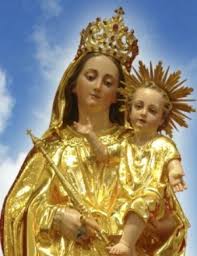HOMILY WEEK 02 05 – Year II
Following the Lord with Faith and Fidelity:
Optional Memorial of Our Lady of Loretto
(Is 48:17-19; Ps 1; Mt 11:16-19)
**************************************************
“Oh, that you had paid attention to my commandments!”
Today’s readings and memorial of Our Lady of Loretto invite us to respond to God’s unconditional covenant love for us by following God’s ways with greater faith and fidelity so we can ultimately lead and enjoy a good life.
There is a book in the bible entitled “Lamentations.” In it the biblical author laments the destruction of Jerusalem by the Babylonians in 586 BCE. It is a poet’s attempt to render the chaos of his world into language that tries to contain and ultimately transform the suffering and hurt that engulfed Jerusalem and its inhabitants.
In the first reading, Isaiah portrays God as lamenting that Israel did not keep or pay attention to God’s commandments, and thus forfeited a life of prosperity, success, fertility and wellbeing. In the gospel, Jesus proclaims a similar lament about the fickleness of the people of his day, just like Isaiah. They did not accept John the Baptist in his frugality, nor did they accept Jesus in his normality. And all they had to do to have a good life, was pay attention to God’s commandments.
In Latin America, the people speak often of “Buen Vivir” or to live well. That is what God wants for all of us – to have a good life that is ultimately best attained by following God’s ways, the path God has set out for God’s people.
At the core of this way of God are the three transcendentals – truth, goodness and beauty. These are the deepest longings of every human heart. Each person on earth wants to know the truth; to experience what is good in their life, and to behold beauty. Ultimately, these are the three attributes of God, who alone is absolute truth, goodness and beauty.
Out problem comes in when we, in our wounded state and in our wounded world, try to make earthly and material versions of these three into the main goal of our lives, which never work, because as St. Augustine put it, our human hearts will be restless until they finally rest in God. We end up breaking or at least falling short of keeping the laws and paths God has provided for us, which can be summed by the following: Love God with our whole being; love our neighbor as ourselves, love others as Jesus has loved us; love and forgive our enemies and those who hurt us, and we could add, live the Beatitudes that are the Magna Carta for a new life in Christ.
In our misguided attempt to fill the emptiness in our souls through our own stubborn self-will, we end up making false gods out of the four basic human needs – possession, prestige, power and pleasure. Our over-attachment and over-identification with these transient realities or goods, causes them to become not good for us, and we commit “hamartia” – sin as falling short of being the persons God intended us to be, and not living the good lives God wants us to live.
Our task is to let go of stubborn self-will and our false pride, become more humble, place our faith and trust in God’s word and commandments, and try to live them as God wants us to live them – to act justly, love tenderly and walk humbly with our God, as the prophet Micah put it.
 Today, we celebrate the optional memorial of Our Lady of Loretto. The Holy House of Loretto (Santa Casa) in Italy has been venerated since the Middle Ages and has been a site of devotion and pilgrimage for centuries. In adding this memorial to the General Calendar in 2019, the Vatican noted that “Saints and Blesseds have responded to their vocation, the sick have invoked consolation in suffering, the people of God have begun to praise and plead with Mary using the Litany of Loretto, which is known throughout the world.” Our Lady of Loretto is the patroness of air travellers and aviation.
Today, we celebrate the optional memorial of Our Lady of Loretto. The Holy House of Loretto (Santa Casa) in Italy has been venerated since the Middle Ages and has been a site of devotion and pilgrimage for centuries. In adding this memorial to the General Calendar in 2019, the Vatican noted that “Saints and Blesseds have responded to their vocation, the sick have invoked consolation in suffering, the people of God have begun to praise and plead with Mary using the Litany of Loretto, which is known throughout the world.” Our Lady of Loretto is the patroness of air travellers and aviation.
The life and teaching of Jesus come to a sort of climax at the meal that we call the Last Supper. The Eucharist is what we do in the in-between times, between the death of the Lord and his coming in glory. It is the meal that even now anticipates the perfect meal of fellowship with God.
May our celebration of the Eucharist empower us to follow the way of the Lord more closely, and enjoy his gift of eternal life right here and now.



